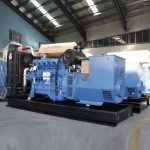Introduction
In today's world, where energy is a vital resource for various industries and households, diesel generators play a crucial role in providing backup power during outages or serving as the primary source of electricity in remote areas. Diesel generators are known for their reliability, durability, and efficiency, making them a popular choice for powering a wide range of applications. One key aspect that makes diesel generators stand out is their fuel efficiency, which not only helps reduce operating costs but also minimizes environmental impact. In this article, we will delve into the world of diesel generators, exploring their fuel efficiency, factors affecting it, and how to maximize it for optimal performance.
Understanding Diesel Generators
Diesel generators are a type of combustion engine-driven generator that converts diesel fuel into electrical energy through the process of combustion. These generators are widely used in various settings, including industrial facilities, commercial buildings, construction sites, and residential properties. The primary components of a diesel generator include the engine, alternator, fuel system, cooling system, and control panel. The engine is the heart of the generator, responsible for converting the chemical energy in diesel fuel into mechanical energy, which is then converted into electrical energy by the alternator.
Fuel Efficiency in Diesel Generators
Fuel efficiency is a critical factor to consider when evaluating the performance of a diesel generator. It refers to the amount of electrical energy produced by the generator relative to the amount of fuel consumed. In simple terms, the higher the fuel efficiency of a diesel generator, the less fuel it will consume to produce a certain amount of electricity. This not only helps reduce operational costs but also minimizes greenhouse gas emissions and environmental impact.
Factors Affecting Fuel Efficiency
Several factors can influence the fuel efficiency of a diesel generator, including the engine design, load profile, maintenance practices, and operating conditions. Understanding these factors is crucial for optimizing the performance of a diesel generator and maximizing its fuel efficiency.
1. Engine Design: The design of the diesel engine plays a significant role in determining the fuel efficiency of a generator. diesel generator set are designed to be more fuel-efficient by utilizing advanced technologies such as electronic fuel injection, turbocharging, and variable valve timing. These technologies help improve combustion efficiency, reduce fuel consumption, and enhance overall performance.
2. Load Profile: The load profile of a diesel generator refers to the pattern of electrical load it experiences over time. Running a diesel generator at varying loads or underloading it can lead to decreased fuel efficiency and increased wear and tear on the engine. It is essential to match the generator's capacity to the electrical load to maintain optimal fuel efficiency.
3. Maintenance Practices: Regular maintenance is crucial for ensuring the optimal performance and fuel efficiency of a diesel generator. Proper maintenance includes routine inspections, servicing of key components such as filters and injectors, and timely replacement of worn-out parts. Neglecting maintenance can lead to decreased fuel efficiency, higher fuel consumption, and costly repairs in the long run.
4. Operating Conditions: The operating conditions of a diesel generator, such as ambient temperature, altitude, and humidity, can impact its fuel efficiency. Extreme temperatures can affect the engine's combustion process and cooling system, leading to decreased efficiency. It is essential to consider these factors when operating a diesel generator to maintain optimal fuel efficiency.

Maximizing Fuel Efficiency
To maximize the fuel efficiency of a diesel generator, several strategies can be employed to ensure optimal performance and reduce fuel consumption. These strategies include:
1. Right Sizing: Selecting a diesel generator that is appropriately sized for the electrical load is crucial for maximizing fuel efficiency. Oversized generators can lead to inefficient operation at partial loads, while undersized generators may struggle to meet the demand, resulting in increased fuel consumption. Conducting a thorough load analysis and selecting a generator with the right capacity can help optimize fuel efficiency.
2. Load Management: Efficient load management is essential for maintaining optimal fuel efficiency in a diesel generator. Balancing the electrical load, avoiding sudden spikes or drops in demand, and utilizing load-sharing techniques can help stabilize the generator's operation and reduce fuel consumption. Implementing energy management systems and smart controls can further enhance load management capabilities.
3. Regular Maintenance: As mentioned earlier, regular maintenance is key to ensuring the fuel efficiency of a diesel generator. Following the manufacturer's maintenance schedule, conducting routine inspections, and addressing any issues promptly can help prevent performance degradation and maximize fuel efficiency. Components such as air filters, fuel filters, oil filters, and injectors should be checked and replaced as needed to maintain peak performance.
4. Fuel Quality: The quality of fuel used in a diesel generator can significantly impact its fuel efficiency and overall performance. Using high-quality diesel fuel with the right specifications and additives can help improve combustion efficiency, reduce emissions, and extend the life of the engine. Regular fuel testing and filtration can help ensure that the fuel meets the required standards for optimal performance.
5. Operating Conditions: Properly managing the operating conditions of a diesel generator is essential for maximizing fuel efficiency. Maintaining the generator in a clean and well-ventilated environment, monitoring ambient temperature and humidity levels, and ensuring proper ventilation and cooling can help optimize performance and reduce fuel consumption. Additionally, avoiding prolonged idling and optimizing the generator's run time can help conserve fuel and minimize emissions.
Conclusion
In conclusion, fuel efficiency is a critical aspect of diesel generators that can have a significant impact on operating costs, environmental sustainability, and overall performance. By understanding the factors affecting fuel efficiency and implementing strategies to maximize it, users can optimize the performance of their diesel generators and achieve long-term cost savings. Proper maintenance, efficient load management, right sizing, fuel quality, and optimal operating conditions are key considerations for enhancing fuel efficiency in diesel generators. As technology continues to advance, diesel generators are expected to become even more fuel-efficient and environmentally friendly, making them an essential power generation solution for various applications.
